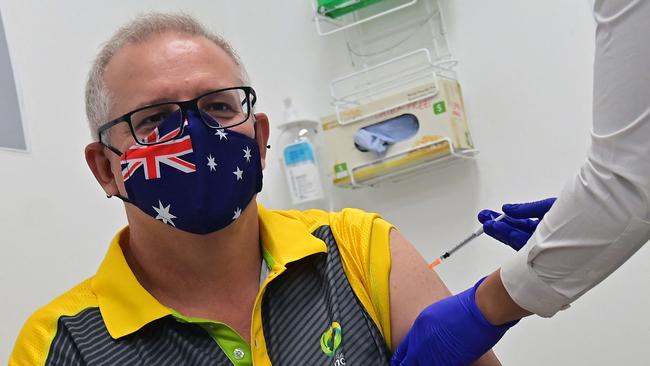In nation’s cafes, Covid vaccine rollout pushes coal off the menu

Running alongside that was simmering resentment over the government’s obstinate refusal to hold a royal commission into the alarmingly high number of suicides among veterans. It is a tribute to the persistence of the families — and independent Tasmanian senator Jacqui Lambie — that they succeeded.
These were just two of the barnacles dragging down the government that only a new minister, and one with the stature and resolve of Dutton, could remove.
Veterans Affairs Minister Darren Chester had been reporting the mood on the ground was toxic. Dutton encountered no resistance from Scott Morrison, who had hinted at reversing the decision on citations last December.
Chief of the Defence Force Angus Campbell, who had declared all of the Brereton report’s recommendations would be accepted, was left hanging off a tree branch. Dutton sawed the limb off on Monday. With luck, Campbell has made a soft landing.
Two other barnacles will not be as easy to scrape off the good ship Morrison as the Prime Minister tries to stabilise before next month in the hope the budget can provide a much-needed reset. Morrison has to get the vaccination rollout right and he has to reposition convincingly on climate change.
If the rollout continues to falter — because of supply, logistics or, equally worryingly now, the euphemistically described vaccination hesitancy, which has not been helped by confusing and inconsistent government messaging — the budget will turn out to be a one-day wonder.
The government has reassured people repeatedly the rollout was not a race and, if it was, it was a marathon. After prodding from the states, particularly Gladys Berejiklian in NSW, Morrison is now sprinting. That’s welcome. Whatever advantages Australia has gained from suppressing COVID-19 need to be maintained or extended, not allowed to dissipate through poor planning or declining community confidence.
GP clinics have reported mass cancellations. They have vaccine stocks, no patients. That’s another reason for the early opening up of vaccinations for the over-50s.
These days the conversations in the wine bars and cafes are not about climate change, as Morrison said so disparagingly to the country’s business elite on Monday night. That’s the good news.
Opposition trade and resources spokeswoman Madeleine King, who looked like the canary down the coalmine earlier this week, attests to that. The bad news is that King went to a coffee shop and a wine bar in Karratha last week (yes, they do exist outside Glebe and Brunswick) and all the locals wanted to talk about was the problems with the vaccination rollout.
Coalition MPs have the same feedback. They say people once reluctant to criticise Morrison because they trusted him now say they are not so sure. The hesitancy factor is not restricted to vaccine safety.
Government MPs bemused by Morrison’s gratuitous insult to inner-city types, a Trumpian ploy that only feeds divisions, figured he was trying to placate the Nationals. Exasperated, they said it showed again how much he was off his game, and how he struggled to get the tone and content right. They wished he would realise every word he said mattered and that, scripted or spontaneous, he needed to take more care.
They affirmed Morrison would not be able to take the final step to commit to net-zero emissions by 2050 without detailing to a joint partyroom exactly how he planned to get there and who would be paying for it. Anything else would open up an internal brawl that would threaten Michael McCormack’s position as Nationals leader.
In the past four elections, Liberal leaders have successfully exploited Labor’s inability to reconcile its conflicting constituencies on climate change and its failure to provide costings on emissions reductions. The tension between Labor’s traditional supporters in mining communities, particularly in coal regions, and the inner-city elites Morrison mocked seemed insoluble.
Morrison is now trapped in a similar web. His slow voyage to net-zero emissions, a word by word, dollar by dollar, hydrogen hub to hydrogen hub transition to maybe, perhaps, moving towards a policy that once dared not speak its name, has been dictated by the Nationals. And it’s not just the ones fulminating publicly.
The road to net zero Morrison says he is on is long, winding, full of potholes, with barbed wire down the middle. And Anthony Albanese, who has reweighted Labor’s policy in an effort to win back its blue-collar vote, is on the same road. They are zigzagging, jumping the wire to switch or steal themes. With a headline in The Australian on Monday that “Labor drops hostility to coal”, it looked like King had been sent out to lay the groundwork or test the air quality before the Opposition Leader’s speech on Tuesday backing in coal while ever the world wanted to buy it, while emphasising the jobs bonanza promised by renewables.
King insists that is not what happened, that the timing was coincidental, that she was expressing Labor’s long-held policy, informed by her experience as the daughter of an industrial chemist who worked for BP, because journalist Greg Brown asked her. Refreshingly forthright, knowledgeable and with a sharp humour, King actually volunteered for the portfolio when Albanese was planning his reshuffle last year. She knows Labor has a way to go but is happy with progress so far.
The one advantage Labor has — and the government knows it — is that Albanese can wait until Morrison spells out the details and cost of his emissions policy before he has to produce his own.



Peter Dutton’s first mission as Defence Minister was to restore the government’s battered reputation among a core constituency, serving and former soldiers. Personnel and veterans were angry over what they saw as grossly unfair punishment meted out in the Brereton report on alleged atrocities in Afghanistan recommending 3000 Afghan veterans, culpable or not, be stripped of their Meritorious Unit Citation.